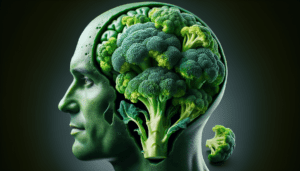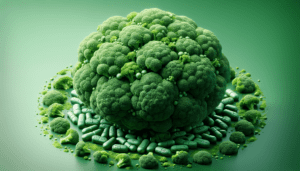Nutritional Value of Broccoli
Broccoli is renowned for its impressive nutritional profile, making it a staple in many vegetarian and vegan diets. This green powerhouse is packed with essential vitamins, minerals, and antioxidants that contribute to its numerous health benefits.
Vitamins and Minerals in Broccoli
Broccoli is loaded with essential nutrients that support overall health and well-being. Here’s a breakdown of the key vitamins and minerals found in broccoli:
| Nutrient | Amount per 1 cup (91g) | % of Daily Value (DV) |
|---|---|---|
| Vitamin C | 81 mg | 90% |
| Vitamin K | 92 mcg | 77% |
| Vitamin A | 567 IU | 11% |
| Folate | 57 mcg | 14% |
| Calcium | 43 mg | 4% |
| Iron | 0.7 mg | 4% |
Data sourced from Healthline and WebMD.
Broccoli is particularly rich in vitamin C, with one cup providing 90% of the daily value. This is more than what an orange can offer, making broccoli an excellent choice for boosting the immune system. Additionally, it is a good source of vitamin K, which is essential for blood clotting and bone health.
Broccoli also contains significant amounts of vitamin A, folate, calcium, and iron. These nutrients play crucial roles in maintaining vision, supporting cell growth, strengthening bones, and transporting oxygen in the blood.
Antioxidants in Broccoli
In addition to its vitamins and minerals, broccoli is packed with powerful antioxidants that help protect the body from oxidative stress and chronic diseases. Some of the notable antioxidants found in broccoli include:
- Sulforaphane: This compound is one of the most potent antioxidants in broccoli. It has been shown to reduce blood sugar levels, lower cholesterol, and protect against oxidative stress.
- Quercetin: Known for its anti-inflammatory properties, quercetin can help reduce the risk of chronic diseases and support heart health.
- Kaempferol: This antioxidant has been linked to a reduced risk of cancer and improved heart health.
Antioxidants like sulforaphane may also have a cancer-preventative effect. Multiple studies have shown that cruciferous vegetables, including broccoli, can protect against certain types of cancer. For more information on this topic, visit our article on broccoli and cancer prevention.
Incorporating broccoli into your diet can provide a wealth of nutrients and antioxidants that contribute to overall health. To learn more about the health benefits of this green powerhouse, check out our article on the benefits of broccoli.
Health Benefits of Broccoli
Broccoli is not just a delicious vegetable; it’s a powerhouse of nutrients that offer a multitude of health benefits. This section delves into how broccoli can aid in blood sugar and cholesterol management, its anti-inflammatory properties, and its potential role in cancer prevention.
Blood Sugar and Cholesterol Management
Broccoli contains potent antioxidants, including sulforaphane, that can offer multiple health benefits. Sulforaphane has been shown to reduce blood sugar levels, making it beneficial for individuals with diabetes. Additionally, the fiber content in broccoli helps regulate blood sugar levels by slowing down the absorption of glucose into the bloodstream.
| Nutrient | Benefit |
|---|---|
| Sulforaphane | Lowers blood sugar levels |
| Fiber | Regulates blood sugar levels |
Moreover, broccoli’s antioxidants can help reduce cholesterol levels. By lowering LDL (bad) cholesterol and increasing HDL (good) cholesterol, broccoli contributes to a healthier cardiovascular system.
For more information on how broccoli can aid in blood pressure management, visit our article on broccoli and blood pressure.
Anti-inflammatory Properties
Broccoli is rich in anti-inflammatory compounds that can help reduce inflammation in the body. Chronic inflammation is linked to various health issues, including heart disease, arthritis, and certain cancers. The sulforaphane in broccoli plays a crucial role in reducing inflammation, particularly in the colon (Medical News Today).
| Compound | Anti-inflammatory Effect |
|---|---|
| Sulforaphane | Reduces colon inflammation |
Additionally, the antioxidants in broccoli, such as vitamin C, contribute to its anti-inflammatory properties. One cup of raw broccoli provides 84% of the reference daily intake (RDI) of vitamin C, more than what one-half orange can offer (Healthline).
To learn more about how broccoli can benefit your digestive system, check out our article on broccoli and digestion.
Cancer Prevention
Broccoli may have a cancer-preventative effect, as multiple studies have shown that cruciferous vegetables, including broccoli, can protect against certain types of cancer (Healthline). The sulforaphane in broccoli is believed to prevent cancer cell formation and slow down the progression of existing cancer cells (WebMD).
| Compound | Cancer-Preventative Effect |
|---|---|
| Sulforaphane | Prevents cancer cell formation |
Broccoli also contains other compounds like glucosinolates, which are broken down into biologically active compounds that have been shown to inhibit the growth of cancer cells.
For detailed insights into how broccoli can help in cancer prevention, visit our dedicated article on broccoli and cancer prevention.
By incorporating broccoli into your diet, you can take advantage of these incredible health benefits. Whether you’re managing blood sugar levels, reducing inflammation, or aiming to prevent cancer, broccoli is a valuable addition to a healthy diet.
Broccoli Preparations and Considerations
Understanding the best ways to prepare and consume broccoli can help maximize its health benefits. This section explores the various cooking methods, potential health risks, and recommended intake for this nutrient-rich vegetable.
Cooking Methods for Broccoli
Broccoli can be prepared in numerous ways, each method affecting its nutritional content differently. The goal is to retain as many nutrients as possible while making the vegetable enjoyable to eat.
| Cooking Method | Nutrient Retention | Description |
|---|---|---|
| Steaming | High | Retains most nutrients, especially vitamins C and K (WebMD) |
| Microwaving | High | Quick and retains a good amount of nutrients |
| Roasting | Moderate | Adds flavor but can reduce some vitamins |
| Sautéing | Moderate | Can retain nutrients if cooked quickly |
| Boiling | Low | Can cause significant nutrient loss, especially water-soluble vitamins |
For the best nutritional value, steaming or microwaving broccoli is recommended. Avoid boiling as it can lead to a substantial loss of nutrients (WebMD).
Health Risks and Considerations
While broccoli is generally safe and beneficial, certain individuals may need to exercise caution.
- Blood Thinners: Broccoli is rich in vitamin K1, which can interfere with blood-thinning medications. Those on such medications should monitor their broccoli intake.
- Kidney Problems: Due to its high potassium content, individuals with kidney issues may need to limit their consumption of broccoli.
- Allergies: Though rare, some people may have an allergic reaction to cruciferous vegetables like broccoli.
For more information on how broccoli can affect specific health conditions, consider reading about broccoli and pregnancy and broccoli and blood pressure.
Recommended Broccoli Intake
To reap the benefits of broccoli, it is essential to consume it in appropriate quantities.
| Age Group | Recommended Intake (Cups per Week) |
|---|---|
| Children (2-3 years) | 1 – 1.5 |
| Children (4-8 years) | 1.5 – 2.5 |
| Adolescents (9-18 years) | 2.5 – 4 |
| Adults | 3 – 4 |
These recommendations are based on general dietary guidelines for vegetable intake. Including broccoli in your diet several times a week can help you achieve the associated health benefits.
For more guidance on incorporating broccoli into your diet, check out our articles on broccoli and weight loss, broccoli and digestion, and broccoli and cancer prevention.
Broccoli and Disease Prevention
Eye and Heart Health Benefits
Broccoli, a staple among cruciferous vegetables, plays a significant role in promoting heart health. Consuming cruciferous vegetables such as broccoli, cabbage, Brussels sprouts, and cauliflower may help prevent clogged arteries, reducing the risk of heart attack and stroke. A study conducted among older women in Australia found that a diet rich in these vegetables could protect against vascular disease.
Research consistently shows a link between higher vegetable consumption and a reduced risk of heart disease and stroke. Women who consumed more vegetables had carotid artery walls that were, on average, 0.05 millimeters thinner, potentially resulting in a 10% to 18% decrease in the risk of stroke and heart attack (Medical News Today).
| Vegetable Intake | Reduction in Carotid Artery Wall Thickness |
|---|---|
| +10 grams of cruciferous vegetables/day | 0.8% reduction |
This protective association was specific to cruciferous vegetables and was not observed for other types of vegetables.
For more on how broccoli aids in heart health, visit broccoli and heart health.
Gut Health and Inflammation
Broccoli also contributes to gut health by promoting a healthy digestive system and reducing inflammation. It contains fiber, which aids in digestion and helps maintain a healthy gut microbiome. Fiber-rich diets are known to reduce the risk of various digestive disorders and improve overall gut health.
Consuming broccoli can also help reduce inflammation in the body, thanks to its high content of antioxidants and anti-inflammatory compounds. These properties can help alleviate symptoms of inflammatory conditions and improve overall health.
For tips on improving digestion with broccoli, visit broccoli and digestion.
Broccoli and Cancer Prevention
One of the most notable health benefits of broccoli is its potential role in cancer prevention. Hundreds of studies since the 1990s have shown a substantial reduction in the risk of genetic diseases among people who consumed large amounts of vegetables compared to those who did not. Diet and nutrition play a significant role in controlling health outcomes, with 70% of wellness outcomes being influenced by lifestyle habits like diet and only 30% by genetics.
Broccoli contains various bioactive compounds, including sulforaphane, which has been shown to have anti-cancer properties. These compounds help neutralize harmful toxins, reduce oxidative stress, and inhibit the growth of cancer cells.
For more detailed information on cancer prevention with broccoli, visit broccoli and cancer prevention.
Incorporating broccoli into your diet can offer numerous health benefits, from protecting your heart to reducing the risk of cancer. To learn more about the nutritional value of broccoli and other benefits of broccoli, explore our related articles.



